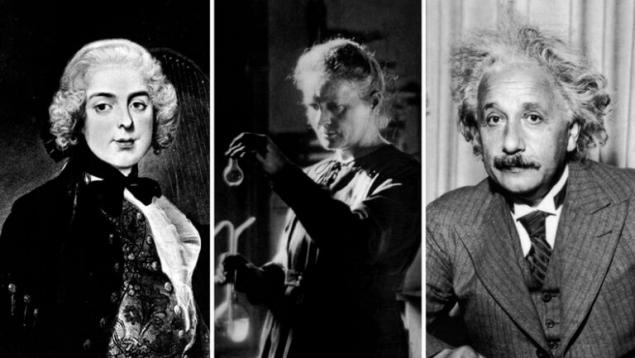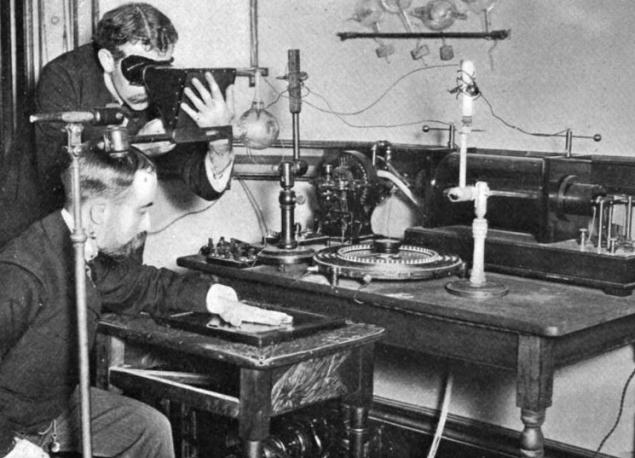477
When it comes to achievements, age – no more than a figure
For many years, scientists who study outstanding achievements, noted that in various areas the peak of achievements occurs more often in early life than in maturity.
However, recently published in the journal Science, the analysis of a large number of scientific careers, indicates the presence of a number of factors that have nothing to do with age. According to the authors, it is the combination of personality, perseverance and sheer luck, and intelligence, leads to outstanding success – at any age.

"The conclusion is that the brother in any case do not give up. When you give up, ending your work" said albert-Laszlo Barabasi, who, along with Roberta Sinatra led a group of scientists who conducted this analysis of materials. Both were physicists at northeastern University in Boston. Since then, Dr. Sinatra went to work at the Central European University in Budapest.
Previous work has allowed to establish that similar combination of elements behind the success of the most outstanding professionals in various fields. A new study shows that the same forces are playing a leading role at all levels: student, young professional, experienced wrestler in mid-career, and even for those who are old enough to take-off caused General surprise.
"What they did is very impressive," said honorary Professor of the University of California, Dean Simonton, who was not involved in this work. "They are sequentially moved from the highest achievements "down" and everywhere I found similar results with respect to all professions. The same relationship, said Dr. Simonton, appear in a wide variety of activities, including composing music, cinema, psychology, and technical creativity.
A group of researchers first focused on the careers of physicists. She had delved into the literature since 1893, which described career 2856 physicists for at least 20 years that publish at least one scientific paper in five years, and often cited work was assessed as "significant," and the group every time he mentioned what stage of your career, these works appeared.
It is quite obvious that the physicians are much more likely to have made the most significant discoveries early in his career. However, the analysis allowed to discover that it had nothing to do with their age.
The whole thing was activity and performance: the young scientists conducted more experiments, thereby increasing the chance of stumbling on something worthwhile. "It's not about age," said Dr. Barabasi. In other words: when the same activity, scientists are equally likely to succeed as 50 and 25 years. The distribution is totally random: the selection of the right project at the right time – just a matter of luck.
However, turning a random choice into a powerful and widely accepted outcome, still depends on a single element that researchers have identified with the letter Q.
Q could be loosely translated as "craftsmanship", a term that likely encompasses a wide range of factors, such as IQ, drive, motivation, openness to new ideas and the ability to work well with other people. Or, more simply, the ability to do most of the work creatively: finding relevance in the everyday ordinary experiment, the ability to grasp and formulate an elegant idea.
"This Q-factor is as interesting as it potentially includes the quality that people have, but do not give them Central importance," says Professor of psychology at the University of Michigan Zach, Hambric. Take for example mathematical psychology. You can publish an interesting discovery, but if your report is impossible to read, and with many works it is indeed the case, you will not be able to achieve wide acceptance because nobody will understand what you say."

A sensational feature of this property, according to the researchers, is that it persists for a long time. Contrary to popular perception, the experience does not increase a person's ability to achieve maximum impact from a particular project. "It is a shocking idea," says Dr. Barabasi. "We found that Q-factor, performance and success are completely independent from each other." The researchers compared data about the careers of the various scientific fields and found that retained the same relationship.
Analyzing the results together, researchers concluded that the most outstanding achievement was the result of a combination of Q-factor, specific strengths and good luck. That is, it is about compliance with a specific scientist or experimenter, or in a broader sense, the author, the subject of its activities, the musician's song, or a dancer – specific dance.
The show-off more money: who and why "status of iphone 7"
Boy I messed up the numbers and called her...
This means that highly productive people may never get to the number of celebrities and a high Q-factor may not lead to career success. "This quality, whatever it may imply, probably varies depending on the scope of activities", said Dr. Simonton.
"That's why you can see people, very successful in one area, when changing activities, not demonstrating similarly high results."published
Translation: Igor Abramov
Source: gearmix.ru/archives/31421
However, recently published in the journal Science, the analysis of a large number of scientific careers, indicates the presence of a number of factors that have nothing to do with age. According to the authors, it is the combination of personality, perseverance and sheer luck, and intelligence, leads to outstanding success – at any age.

"The conclusion is that the brother in any case do not give up. When you give up, ending your work" said albert-Laszlo Barabasi, who, along with Roberta Sinatra led a group of scientists who conducted this analysis of materials. Both were physicists at northeastern University in Boston. Since then, Dr. Sinatra went to work at the Central European University in Budapest.
Previous work has allowed to establish that similar combination of elements behind the success of the most outstanding professionals in various fields. A new study shows that the same forces are playing a leading role at all levels: student, young professional, experienced wrestler in mid-career, and even for those who are old enough to take-off caused General surprise.
"What they did is very impressive," said honorary Professor of the University of California, Dean Simonton, who was not involved in this work. "They are sequentially moved from the highest achievements "down" and everywhere I found similar results with respect to all professions. The same relationship, said Dr. Simonton, appear in a wide variety of activities, including composing music, cinema, psychology, and technical creativity.
A group of researchers first focused on the careers of physicists. She had delved into the literature since 1893, which described career 2856 physicists for at least 20 years that publish at least one scientific paper in five years, and often cited work was assessed as "significant," and the group every time he mentioned what stage of your career, these works appeared.
It is quite obvious that the physicians are much more likely to have made the most significant discoveries early in his career. However, the analysis allowed to discover that it had nothing to do with their age.
The whole thing was activity and performance: the young scientists conducted more experiments, thereby increasing the chance of stumbling on something worthwhile. "It's not about age," said Dr. Barabasi. In other words: when the same activity, scientists are equally likely to succeed as 50 and 25 years. The distribution is totally random: the selection of the right project at the right time – just a matter of luck.
However, turning a random choice into a powerful and widely accepted outcome, still depends on a single element that researchers have identified with the letter Q.
Q could be loosely translated as "craftsmanship", a term that likely encompasses a wide range of factors, such as IQ, drive, motivation, openness to new ideas and the ability to work well with other people. Or, more simply, the ability to do most of the work creatively: finding relevance in the everyday ordinary experiment, the ability to grasp and formulate an elegant idea.
"This Q-factor is as interesting as it potentially includes the quality that people have, but do not give them Central importance," says Professor of psychology at the University of Michigan Zach, Hambric. Take for example mathematical psychology. You can publish an interesting discovery, but if your report is impossible to read, and with many works it is indeed the case, you will not be able to achieve wide acceptance because nobody will understand what you say."

A sensational feature of this property, according to the researchers, is that it persists for a long time. Contrary to popular perception, the experience does not increase a person's ability to achieve maximum impact from a particular project. "It is a shocking idea," says Dr. Barabasi. "We found that Q-factor, performance and success are completely independent from each other." The researchers compared data about the careers of the various scientific fields and found that retained the same relationship.
Analyzing the results together, researchers concluded that the most outstanding achievement was the result of a combination of Q-factor, specific strengths and good luck. That is, it is about compliance with a specific scientist or experimenter, or in a broader sense, the author, the subject of its activities, the musician's song, or a dancer – specific dance.
The show-off more money: who and why "status of iphone 7"
Boy I messed up the numbers and called her...
This means that highly productive people may never get to the number of celebrities and a high Q-factor may not lead to career success. "This quality, whatever it may imply, probably varies depending on the scope of activities", said Dr. Simonton.
"That's why you can see people, very successful in one area, when changing activities, not demonstrating similarly high results."published
Translation: Igor Abramov
Source: gearmix.ru/archives/31421
At the Massachusetts Institute of technology have developed roboscooter
Pumpkin, baked with vegetables























